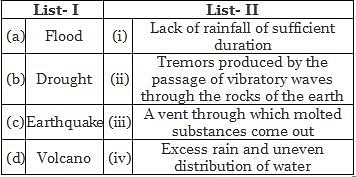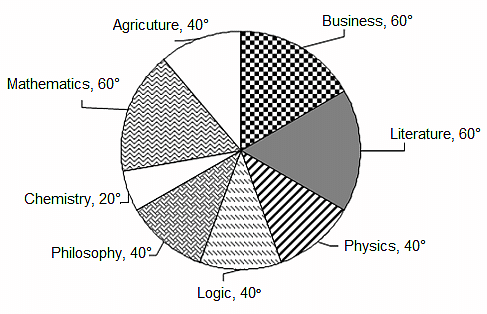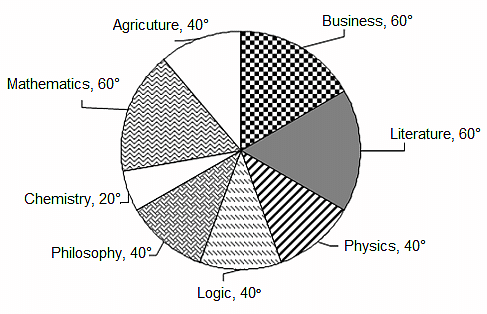UGC NET Paper 1 Practice Test - 2 - UGC NET MCQ
30 Questions MCQ Test UGC NET Mock Test Series 2024 - UGC NET Paper 1 Practice Test - 2
What is the basis on which assumptions are formulated?
Direction: Read the given passage and answer the questions that follow.
Early feminist theory had emphasised the commonalities of women's oppression, neglecting profound differences between women in terms of class, age, religion, race and nation. As its exclusionary nature became evident, the collective 'we' of feminism was called into question. The inadequacies of feminist theorising that conflated the condition of white, middle class women with the condition of all women were highlighted in North America by black and Latin feminists, and in Britain by black and Asian feminists. Such critiques evoked the concepts of 'inter‐locking identities' and inter‐locking oppressions'. Related and more radical analyses came from feminist scholars in the Third world, where quite different agendas were called for. These critiques heightened the irrelevance of western feminism's analytical frameworks to the lives of most women around the world and attempted to reposition feminist debate within broader social, economic and cultural contexts of analysis advocated by scholars such as Janus. Such critiques spoke from a post‐colonial position, in which the self‐assumed authority of western feminists to speak about or indeed for others was disputed and decentered. Influential accounts of the tendencies of masculinist imperialist ideological formation to construct a 'monolithic Third world' woman', discursively constituted as the universal victim of Third world patriarchy, challenged feminists to "unlearn" their privilege and to deconstruct their own authority as intellectuals. These positions appeared to question the legitimacy of outside intervention of any kind, whether intellectual or political. Although subsequently attempted by the Third world scholars anxious to move beyond standpoints that threatened to mark all feminist politics as either inauthentic or unnecessary, they were enduringly influential in highlighting the questions identity and authority in feminist studies.
Q. The early feminist theory ignored among women, the issue of:
Early feminist theory had emphasised the commonalities of women's oppression, neglecting profound differences between women in terms of class, age, religion, race and nation. As its exclusionary nature became evident, the collective 'we' of feminism was called into question. The inadequacies of feminist theorising that conflated the condition of white, middle class women with the condition of all women were highlighted in North America by black and Latin feminists, and in Britain by black and Asian feminists. Such critiques evoked the concepts of 'inter‐locking identities' and inter‐locking oppressions'. Related and more radical analyses came from feminist scholars in the Third world, where quite different agendas were called for. These critiques heightened the irrelevance of western feminism's analytical frameworks to the lives of most women around the world and attempted to reposition feminist debate within broader social, economic and cultural contexts of analysis advocated by scholars such as Janus. Such critiques spoke from a post‐colonial position, in which the self‐assumed authority of western feminists to speak about or indeed for others was disputed and decentered. Influential accounts of the tendencies of masculinist imperialist ideological formation to construct a 'monolithic Third world' woman', discursively constituted as the universal victim of Third world patriarchy, challenged feminists to "unlearn" their privilege and to deconstruct their own authority as intellectuals. These positions appeared to question the legitimacy of outside intervention of any kind, whether intellectual or political. Although subsequently attempted by the Third world scholars anxious to move beyond standpoints that threatened to mark all feminist politics as either inauthentic or unnecessary, they were enduringly influential in highlighting the questions identity and authority in feminist studies.
| 1 Crore+ students have signed up on EduRev. Have you? Download the App |
Direction: Read the given passage and answer the questions that follow.
Early feminist theory had emphasised the commonalities of women's oppression, neglecting profound differences between women in terms of class, age, religion, race and nation. As its exclusionary nature became evident, the collective 'we' of feminism was called into question. The inadequacies of feminist theorising that conflated the condition of white, middle class women with the condition of all women were highlighted in North America by black and Latin feminists, and in Britain by black and Asian feminists. Such critiques evoked the concepts of 'inter‐locking identities' and inter‐locking oppressions'. Related and more radical analyses came from feminist scholars in the Third world, where quite different agendas were called for. These critiques heightened the irrelevance of western feminism's analytical frameworks to the lives of most women around the world and attempted to reposition feminist debate within broader social, economic and cultural contexts of analysis advocated by scholars such as Janus. Such critiques spoke from a post‐colonial position, in which the self‐assumed authority of western feminists to speak about or indeed for others was disputed and decentered. Influential accounts of the tendencies of masculinist imperialist ideological formation to construct a 'monolithic Third world' woman', discursively constituted as the universal victim of Third world patriarchy, challenged feminists to "unlearn" their privilege and to deconstruct their own authority as intellectuals. These positions appeared to question the legitimacy of outside intervention of any kind, whether intellectual or political. Although subsequently attempted by the Third world scholars anxious to move beyond standpoints that threatened to mark all feminist politics as either inauthentic or unnecessary, they were enduringly influential in highlighting the questions identity and authority in feminist studies.
Q. The analytical frameworks of western feminists were critiqued by Third world scholars as:
Early feminist theory had emphasised the commonalities of women's oppression, neglecting profound differences between women in terms of class, age, religion, race and nation. As its exclusionary nature became evident, the collective 'we' of feminism was called into question. The inadequacies of feminist theorising that conflated the condition of white, middle class women with the condition of all women were highlighted in North America by black and Latin feminists, and in Britain by black and Asian feminists. Such critiques evoked the concepts of 'inter‐locking identities' and inter‐locking oppressions'. Related and more radical analyses came from feminist scholars in the Third world, where quite different agendas were called for. These critiques heightened the irrelevance of western feminism's analytical frameworks to the lives of most women around the world and attempted to reposition feminist debate within broader social, economic and cultural contexts of analysis advocated by scholars such as Janus. Such critiques spoke from a post‐colonial position, in which the self‐assumed authority of western feminists to speak about or indeed for others was disputed and decentered. Influential accounts of the tendencies of masculinist imperialist ideological formation to construct a 'monolithic Third world' woman', discursively constituted as the universal victim of Third world patriarchy, challenged feminists to "unlearn" their privilege and to deconstruct their own authority as intellectuals. These positions appeared to question the legitimacy of outside intervention of any kind, whether intellectual or political. Although subsequently attempted by the Third world scholars anxious to move beyond standpoints that threatened to mark all feminist politics as either inauthentic or unnecessary, they were enduringly influential in highlighting the questions identity and authority in feminist studies.
Direction: Read the given passage and answer the questions that follow.
Early feminist theory had emphasised the commonalities of women's oppression, neglecting profound differences between women in terms of class, age, religion, race and nation. As its exclusionary nature became evident, the collective 'we' of feminism was called into question. The inadequacies of feminist theorising that conflated the condition of white, middle class women with the condition of all women were highlighted in North America by black and Latin feminists, and in Britain by black and Asian feminists. Such critiques evoked the concepts of 'inter‐locking identities' and inter‐locking oppressions'. Related and more radical analyses came from feminist scholars in the Third world, where quite different agendas were called for. These critiques heightened the irrelevance of western feminism's analytical frameworks to the lives of most women around the world and attempted to reposition feminist debate within broader social, economic and cultural contexts of analysis advocated by scholars such as Janus. Such critiques spoke from a post‐colonial position, in which the self‐assumed authority of western feminists to speak about or indeed for others was disputed and decentered. Influential accounts of the tendencies of masculinist imperialist ideological formation to construct a 'monolithic Third world' woman', discursively constituted as the universal victim of Third world patriarchy, challenged feminists to "unlearn" their privilege and to deconstruct their own authority as intellectuals. These positions appeared to question the legitimacy of outside intervention of any kind, whether intellectual or political. Although subsequently attempted by the Third world scholars anxious to move beyond standpoints that threatened to mark all feminist politics as either inauthentic or unnecessary, they were enduringly influential in highlighting the questions identity and authority in feminist studies.
Q. The passage speaks of:
Which of the following is not an example of a continuous variable?
Which of the following does not belong to a projected aid?
Which of the following is not a principle of effective communication?
"Spare the rod and spoil the child", gives the message that
In a classroom, a communicator’s trust level is determined by
Which of the following problems is related to classroom management?
The communication which happens outside the realm of interpersonal communication is called:
Directions: Read the following passage carefully and answer the question.
I had occasion to work with her closely during the Women's International Year in 1975 when she was chairing a Steering Committee and made me the member in charge of publicity. Representatives from different political parties and women's organisations were on the committee, and though the leftists claimed a sort of proprietary right over her, Aruna encouraged and treated all members alike. It was not her political affiliations or her involvement in a particular cause, which won her respect and recognition, but her utter honesty in public life, her integrity and her compassion for the oppressed which made her an adorable person. She had the courage to differ with and defy the mightiest in the land; yet her human spirit prompted her to work in the worst of slums to offer succour to the poor and the exploited.
In later years – around late eighties and early nineties – Aruna Asaf Ali's health began to deteriorate. Though her mind remained alert, she could not actively take up her pet causes – action for women's advancement, planning for economic justice, role of media, reaffirmation of values in public affairs etc. Slowly, her movements were restricted and Aruna, who had drawn sustenance from common people, from her involvement in public life, became a lonely person. She passed away in July 1996.
Q. Who were made the members of the Committee of Publicity?
(i) Representatives from different political parties
(ii) Representatives from the leftist parties
(iii) Representatives from the women's organisations
(iv) None of the above
Directions: Read the following passage carefully and answer the question.
I had occasion to work with her closely during the Women's International Year in 1975 when she was chairing a Steering Committee and made me the member in charge of publicity. Representatives from different political parties and women's organisations were on the committee, and though the leftists claimed a sort of proprietary right over her, Aruna encouraged and treated all members alike. It was not her political affiliations or her involvement in a particular cause, which won her respect and recognition, but her utter honesty in public life, her integrity and her compassion for the oppressed which made her an adorable person. She had the courage to differ with and defy the mightiest in the land; yet her human spirit prompted her to work in the worst of slums to offer succour to the poor and the exploited.
In later years – around late eighties and early nineties – Aruna Asaf Ali's health began to deteriorate. Though her mind remained alert, she could not actively take up her pet causes – action for women's advancement, planning for economic justice, role of media, reaffirmation of values in public affairs etc. Slowly, her movements were restricted and Aruna, who had drawn sustenance from common people, from her involvement in public life, became a lonely person. She passed away in July 1996.
Q. Who tried to monopolise Aruna as their proprietary right?
Global warming during winter becomes more pronounced at the:
(A) Equator
(B) Poles
(C) Tropic of Cancer
(D) Tropic of Capricorn
Choose the correct answer from the options given below:
Interaction inside the classroom should generate
“Male and female students perform equally well in a numerical aptitude test.” This statement indicates-
A major barrier in the transmission of cognitive data in the process of communication is an individual's
Match List-I and List-II and select the correct answer from the codes given below:

If a researcher conducts a research on finding out which administrative style contributes more to institutional effectiveness? This will be an example of__________.
Directions: Answer the given question based on the following data.
Total number of students in the university = 2160

Q. Total number of students of Philosophy and Logic is more than the total number of students of Physics and Chemistry by
Directions: Answer the given question based on the following data.
Total number of students in the university = 2160

Q. On a particular day, if the students of Mathematics, Physics and Chemistry go on a strike and all the students of other disciplines attend the classes, find the ratio of the total number of Agriculture students to the total number of students who attend the classes.
Educational technology that has its origin in physical science and engineering:
a. Educational technology I
b. Educational Technology II
c. Hard approach
d. Soft approach
Select the correct answer from the code given below:
Directions: In making decisions about an important question, it is desirable to be able to distinguish between 'strong' arguments and 'weak' arguments. 'Strong' arguments are those which are both important and directly related to the question. 'Weak' arguments are those which are of minor importance and also may not be directly related to the question or may be related to a trivial aspect of the question.
The given question is followed by arguments numbered I and II. You have to decide which of the arguments is/are 'strong' argument(s) and which is/are 'weak' argument(s) and mark your answer accordingly.
Q. Should Indians shift their focus on other games rather than cricket, the much revered game in India, to improve performance in Olympics?
Arguments:
I. No, India has more important issues like malnutrition and lack of sanitation and hygiene to address.
II. Yes, many potential players have lost hope to make a career in sports due to lack of attention to other sports, as compared to cricket.
UGC-CARE has been set up for promoting:
A. Quality research
B. Academic integrity
C. Publication ethics
D. Inclusion and access
E. International collaborative research
Choose the correct option from those given below:
The statement, 'Bravery is not a quality of the body. It is of the soul' is a/an
What was the main agenda of the Incheon Declaration held by UNESCO in 2015?
Directions: Examine the following statements carefully and answer the question that follows.
I. All children are inquisitive.
II. Some children are inquisitive.
III. No children are inquisitive.
IV. Some children are not inquisitive.
Of the given statements, the two statements which cannot both be true simultaneously, but can both be false, would be
Which of the following characters are part of education through computers?
a. Speed
b. Accuracy
c. Storage
d. Intelligence
|
16 docs|120 tests
|


 = 120
= 120 720
720 240
240














